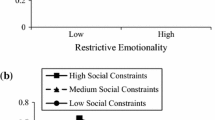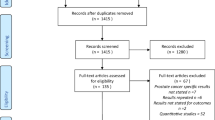Abstract
We examined how two male gender-related traits, agency (focus on self) and unmitigated agency (focus on self to the exclusion of others), were related to physical and emotional functioning in 162 men (92% Caucasian) treated for prostate cancer. As predicted, unmitigated agency was associated with worse functioning and more cancer-related difficulties. By contrast, agency was associated with better functioning and fewer cancer-related difficulties. We tested whether difficulties expressing emotions explained these relations. Unmitigated agency was associated with difficulty expressing emotions, and agency was associated with the ability to express emotions. Structural equation modeling was used to show that emotional expressiveness mediated the relations of unmitigated agency and agency to adjustment to prostate cancer. The implications of these results for interventions to enhance men's adjustment to prostate cancer are discussed.
Similar content being viewed by others
REFERENCES
American Cancer Society. (1996). Cancer facts and figures. Atlanta, GA: American Cancer Society.
Barbee, A. P., Cunningham, M. R., Winstead, B. A., Derlega, V. J., Gulley, M. R., Yankeelov, P. A., & Druen, P. B. (1993). Effects of gender role expectations on the social support process. Journal of Social Issues, 49, 175-190.
Bagshaw, M. A., Cox, R. S., & Ray, G. R. (1988). Status of radiation treatment of prostate cancer at Stanford University. In: NCI Monographs, No. 7. Washington, DC: Government Printing Office (NIH Pub. No. 88 3005): 127-131.
Bassoff, E., & Glass, G. (1982). The relationship between sex roles and mental health: A meta-analysis of 26 studies. The Counseling Psychologist, 10, 105-112.
Bem, S. (1974). The measurement of psychological androgyny. Journal of Consulting and Clinical Psychology, 42, 165-174.
Bentler, P. (1990). Comparative fit indexes in structural models. Psychological Bulletin, 107, 238-246.
Bentler, P. (1995). EQS Structural equations program manual. Encino, CA: Multivariate Software, Inc.
Brannon, R., & Juni, S. (1984). A scale for measuring attitudes toward masculinity. Psychological Documents, 14, 6 (Ms. 2012).
Downs, A. C., & Engleson, S. A. (1982). The attitudes toward men scale (AMS): An analysis of the role and status of men and masculinity. JSAS Catalog of Selected Documents in Psychology, 12, 45 (Ms. 2505).
Doyle, J. A., & Moore, R. J. (1978). Attitudes toward the male role scale: An objective instrument to measure attitudes towards the male's sex role in contemporary society. JSAS Catalog of Selected Documents in Psychology, 8, 35-36 (Ms. 1678).
Eisler, R. M., & Skidmore, J. R. (1987). Masculine gender role stress: Scale development and component factors in the appraisal of stressful situations. Behavior Modification, 11, 123-136.
Evans, R. G., & Dinning, W. D. (1982). MMPI correlates of the Bem Sex Role Inventory and Extended Personal Attributes Questionnaire in a male psychiatric sample. Journal of Clinical Psychology, 38, 811-815.
Fowler, F. J., Barry, M. J., Lu-Yoa, G., Wasson, J., Roman, A., & Wennberg, J. (1995). The effect of radical prostatectomy for prostate cancer on patient quality of life: Results from a medicare survey. Urology, 44, 600-607.
Goldberg, H. (1976). The hazards of being male. New York: Sanford J. Greenburger Associates, Inc.
Green, R. L. (1987). Psychosocial consequences of prostate cancer—my father's illness and review of the literature. Psychiatric Medicine, 5, 315-327.
Harber, K. D., & Pennebaker, J. (1992). Overcoming traumatic memories. In S. A. Christianson (Ed.), The handbook of emotion and memory. Hillsdale, NJ: Erlbaum.
Helgeson, V. S. (1990). The role of masculinity in a prognostic predictor of heart attack severity. Sex Roles, 22, 755-774.
Helgeson, V. S. (1993). Implications of agency and communion for patient and spouse adjustment to a first coronary event. Journal of Personality and Social Psychology, 64, 807-816.
Helgeson, V. S. (1994). Relation of agency and communion to well-being: Evidence and potential explanations. Psychological Bulletin, 116, 412-428.
Helgeson, V. S., & Cohen, S. (1996). Social support and adjustment to cancer: Reconciling descriptive, correlational, and intervention research. Health Psychology, 15, 135-148.
Hu, L., & Bentler, P. M. (1995). Evaluating model fit. In R. H. Hoyle (Ed.), Structural equation modeling: Concepts, issues, and applications. Thousand Oaks, CA: Sage Publications.
Hu, L., Bentler, P. M., & Kano, Y. (1992). Can test statistics in covariance structure analysis be trusted? Psychological Bulletin, 112, 351-362.
Janoff-Bulman, R. (1992). Shattered assumptions: Towards a new psychology of trauma. The Free Press: New York.
Kornblith, A. B., Herr, H. W., Ofman, U. S., Scher, H. I., & Holland, J. C. (1994). Quality of life of patients with prostate cancer and their spouses. Cancer, 73, 2791-2802.
Lepore, S. J., & Helgeson, V. S. (in press). Social constraints, intrusive thoughts, and mental health after prostate cancer. Journal of Social and Clinical Psychology.
Levant, R. F., Hirsch, L., Celentano, E., Cozza, T., Hill, S., MacEachern, M., Marty, N., & Schnedeker, J. (1992). The male role: An investigation of contemporary norms. Journal of Mental Health Counseling, 14, 325-337.
Nichols, J. (1975). Men's liberation: A new definition of masculinity. Middlesex, England: Penguin Books.
O'Neil, J. M., Helms, B. J., Gable, R. K., David, L., & Wrightsman, L. S. (1986). Gender-role conflict scale: College men's fear of femininity. Sex Roles, 14, 335-350.
Pennebaker, J. W. (1989). Confession, inhibition, and disease. In L. Berkowitz (Ed.), Advances in experimental social psychology (Vol. 22). Orlando, FL: Academic Press.
Pleck, J. H., Sonenstein, F. L., & Ku, L. C. (1993). Masculinity ideology and its correlates. In S. Oskamp & M. Costanzo (Eds.), Gender issues in contemporary society. Newbury Park, CA: Sage Publications.
Rieker, P. P., Edbril, S. D., & Garnick, M. B. (1985). Curative testis cancer therapy: Psychosocial sequelae. Journal of Clinical Oncology, 3, 1117-1126.
Schag, C. C., & Heinrich, R. L. (1989). Cancer Rehabilitation Evaluation System (CARES) Manual (Ed. 1). Los Angeles: CARES Consultants.
Sharp, J. W., Blum, D., & Aviv, L. (1993). Elderly men with cancer: Social work interventions in prostate cancer. Social Work in Health Care, 19, 91-107.
Snell, W. E. (1986). The masculine role inventory: Components and correlates. Sex Roles, 15, 443-455.
Spence, J. T. (1984). Masculinity, femininity, and gender-related traits: A conceptual analysis and critique of current research. In B. A. Maher & W. B. Maher (Eds.), Progress in experimental personality research (Vol. 13). San Diego, CA: Academic Press.
Spence, J. T., Helmreich, R., & Holahan, C. K. (1979). Negative and positive components of psychological masculinity and femininity and their relationship to self-reports of neurotic and acting out behaviors. Journal of Personality and Social Psychology, 37, 1673-1682.
Spence, J. T., Helmreich, R., & Stapp, J. (1974). The Personal Attributes Questionnaire: A measure of sex-role stereotypes and masculinity-feminity. JSAS Catalog of Selected Documents in Psychology, 4, 43.
Stewart, A. L., Greenfield S., Hays, R. D., Wells, K., Rogers, W. H., Berry, S. D., McGlynn, E. A., & Ware, J. E. (1989). Functional status and well-being of patients with chronic conditions. The MOS Short-Form General Health Survey. Journal of the American Medical Association, 262, 907-913.
Stewart, A. L., Hays, R. D., & Ware, J. E. (1988). The MOS Short-Form General Health Survey. Medical Care, 26, 724-735.
Taylor, S. E., Falke, R. L., Mazal, R. M., & Hilsberg, B. L. (1988). Sources of satisfaction and dissatisfaction among members of cancer support groups. In B. H. Gottlieb (Ed.), Marshaling social support: Formats, processes and effects. Newbury Park, CA: Sage.
Thompson, E. H., & Pleck, J. H. (1995). Masculine ideology: A review of research instrumentation on men and masculinities. In R. F. Levant & W. S. Pollack (Eds.), A new psychology of men. New York: Basic Books.
Thompson, E. H., Jr., Pleck, J. H., & Ferrera, D. L. (1992). Men and masculinities: Scales for masculinity ideology and masculinity-related constructs. Sex Roles, 27, 573-607.
Ware, J. E., Kosinski, M., & Keller, S. D. (1994). SF-36 Physical and Mental Health Summary Scales: A user's manual. Boston, MA: The Health Institute.
Wells, K. B., Stewart, A., Hays, R. D., Burnam, M. A., Rogers, W., Daniels, M., Berry, S., Greenfield, S., & Ware, J. (1989). Detection of depressive disorder for patients receiving prepaid or fee-for-service care: Results from the Medical Outcomes Study. Journal of the American Medical Association, 262, 914-919.
Whitley, B. E. (1983). Sex role orientation and self-esteem: A critical meta-analytic review. Journal of Personality and Social Psychology, 44, 765-778.
Whitley, B. E. (1984). Sex role orientation and psychological well-being: Two meta-analyses. Sex Roles, 12, 207-225.
Author information
Authors and Affiliations
Rights and permissions
About this article
Cite this article
Helgeson, V.S., Lepore, S.J. Men's Adjustment to Prostate Cancer: The Role of Agency and Unmitigated Agency. Sex Roles 37, 251–267 (1997). https://doi.org/10.1023/A:1025651912128
Issue Date:
DOI: https://doi.org/10.1023/A:1025651912128




